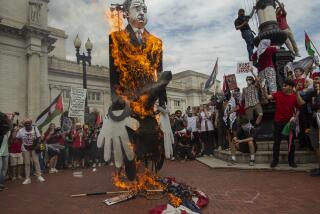Slow to Anger, Awesome in Fury
- Share via
Our enemies like to say that liberal democracies cannot fight. That we’re too smug. The comforts of capitalism, they say, and personal freedom have made us soft -- and without statesmen wearing epaulets and sunglasses, they assert, we will always prefer talk to action.
This was the Nazi view of the United States, the Japanese dogma and, most recently, the Iraqi critique. But it was a cheap slur -- and a wrong reading of history.
In fact, liberal societies have an excellent record in going to war, from Marathon to the capture of Baghdad. Sometimes we get there late, or unprepared -- as in the belated defense at Thermopylae or our failure to act against Hitler in the 1930s -- but when we’re galvanized, we make frightening war.
Indeed, the Civil War battle of Antietam, the horror at the Somme in World War I and the World War II bloodletting of Okinawa suggest that once democracies go to war, they are willing to pay a horrific price to eliminate -- not merely to defeat -- illiberal societies. Democracies, once they get their dander up, are often as hard to restrain as they were to incite in the first place.
It is easy to libel William Tecumseh Sherman and his terrible march through Georgia in autumn 1864, which covered about the same 300-mile distance through the heart of enemy territory as the present roll from Kuwait to Baghdad. But Sherman’s exuberant army of Midwestern yeomen freed 40,000 slaves, killed no more than 600 Southern youth and targeted the icons of the Confederacy and the plantations of the secessionists. His critics, even at the time, protested that the use of force was inconsistent with the values of a liberal society. But Sherman called that “bottled piety” because they never explained how an evil like slavery or, we might add, Saddam Hussein is to be removed without violence.
There is a paradox in democratic warfare. We are ill at ease with arms, yet we wield them effectively. We need firebrands like Gens. Sherman, George S. Patton and Curtis LeMay -- and then we often tire of them when the smoke clears.
But there can be no denying war’s purpose or utility. Three million Afghan women are in school today and a vast Al Qaeda camp is removed because of the bravery of the U.S. Special Forces and because of the skill of our pilots -- not because of the petitions of our well-meaning pacifists. Iraq will be liberated and its 26 million people given a chance of freedom because of the courage of American teenagers in Abrams tanks, not because of “concerned” professors who chanted “no blood for oil” between lattes.
Since Sept. 11, we have heard an array of invective aimed at Secretary of Defense Donald Rumsfeld, Vice President Dick Cheney, Paul Wolfowitz and others who reminded us of these ancient, tragic truths and who told us that our democratic nation would have to use arms to restore its security and eliminate terrorists and rogue societies -- and that it would do so in an overwhelmingly successful fashion.
The events of the last two years have utterly vindicated these democratic warriors, but do not expect their critics to concede that democracies sometimes must resort to war to remove evil. You see, it is just not in their nature.
More to Read
Sign up for Essential California
The most important California stories and recommendations in your inbox every morning.
You may occasionally receive promotional content from the Los Angeles Times.













